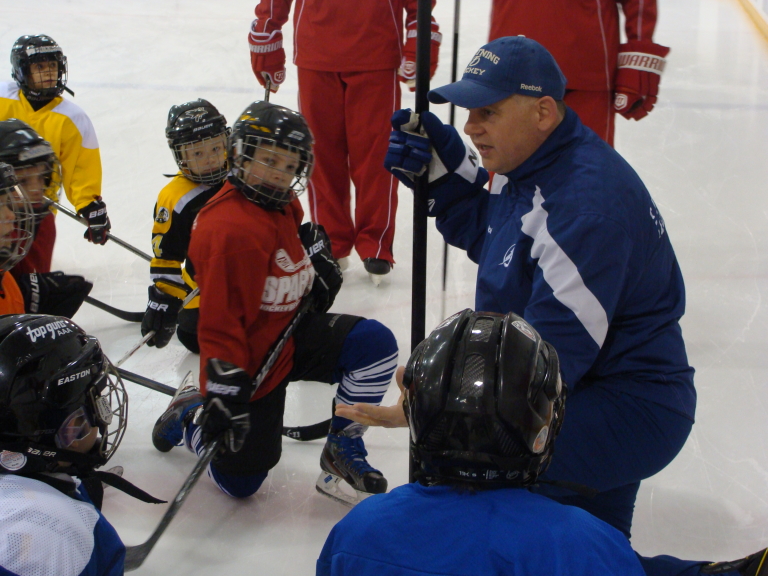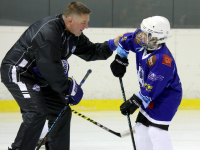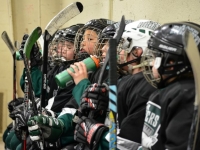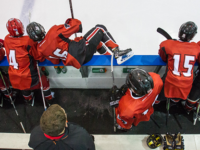Being the parent of a child in minor hockey is a challenge, to say the least. First, there are mounds of start-up costs, like registration and equipment. Then you need to make time and arrange rides every week for practices and games. Apart from the usual schedule, the team can also host fundraisers, other off-ice events, and might take trips for away-games or tournaments. All of those will cost some money and time too.
Coordinating your life around your child’s hockey events can be difficult enough when you have a partner to help you out along the way. However, some hockey parents don’t have that luxury. They’re going at it on their own, doing their best to balance everything else in their often hectic lives along with their child’s hockey schedule.
If you’re the single parent of a current or upcoming minor hockey athlete and are finding it difficult to adjust, fear not! Below are three tips for how to navigate single parenting in minor hockey while keeping your head on straight.
Know Your Options for Financial Help
One challenge that will sometimes come with being a single parent is financial stability. In fact, you can consider yourself lucky if you’re a single parent and are able to easily afford the start-up costs associated with minor hockey. For most lone-parent families, their financial situation is not ideal. However, that should never stop their kids from being able to participate in hockey and enjoy the numerous benefits that organized sports bring.
As a single parent in minor hockey, it’s important to be aware of the options that are available for financial help. These options can remove a huge burden and source of stress when getting your child started in hockey.
First, there is a fantastic nation-wide non-profit organization called KidSport. They provide financial assistance for both registration fees and equipment in the form of grants. All you need to do is fill out a short application, so they can determine whether your situation is fitting to receive a grant and how much it should be for. KidSport has provided millions of dollars in grants to kids across Canada just in the last year so that they can participate in organized sports. You can visit kidsportcanada.ca to donate or apply for a grant.
There are also tons of local non-profit organizations and municipal sport funding programs across Canada. These programs work the same way as KidSport does where you apply for grants to help fund your child’s sporting costs. The difference is that they are all locally based, and there are loads of them. Be sure to research the programs and organizations in your area that help fund children of single-parent and/or lesser-privileged families to play sports.
Some organizations also offer a bursary fund. You can inquire to the coach/team you’re interested in.
Get to Know the Other Parents
Sure, making friends with the other hockey parents of your child’s team is a good idea whether you’re a single parent or not. However, it can be especially beneficial for single parents. First and foremost, friends are a great thing. Having a buddy at all your kid’s practices and games can make staying to watch even more enjoyable, since you’ll have someone to talk to. Plus, since your kids are on the same hockey team, there’s a good chance that they’ll end up being friends with each other as well!
The big benefit of knowing other parents of kids on the team is carpooling. This can save you a ton of hassle, money, and time. Even only knowing just a couple of other parents will create an opportunity to make a carpooling group so that you only need to drive once every third practice and game. If you’re okay with missing your kid’s games and practices every so often, carpooling with other hockey parents can be a lifesaver. This can especially help if you don’t have a vehicle or travelling to the games and practices is otherwise difficult.
Also, if you decide to enroll your kid in hockey for another season afterwards, you’ll see a lot of the same families returning for the next season as well. So, the relationships you build in your first season will likely last very long if you decide to come back with you kid to play more. Then you won’t have to worry about setting up a carpooling group for the next season!
Keep a Clear Schedule
Not everything about your child’s hockey schedule will be straightforward. Some practices will be moved from their usual times, games can move both times and locations from week to week, and there will be extra events like fundraisers to keep track of as well. The final tip for navigating minor hockey as a single parent is to keep a clear and concise hockey schedule for your child.
It can be very easy to miss games, practices, or other events if you don’t keep track of them well enough. Depending on the age of your kid, they often can’t be reliable to remember their own schedule, so you’ll likely have to be running the show, reminding them when they need to get ready for something. Keeping a clear schedule will make it way easier to keep tabs on everything going on and ensure that you won’t miss anything.
A simple and effective way to do this is to buy a large, customizable monthly calendar and put it in a place where you’re forced to look at it, like on the fridge. Then fill it out with your child’s hockey events and just remember to check it every so often. Some people would prefer to use their phones and set reminders or other methods too. Whatever the case, the important thing is to keep organized and document every important date.
That isn’t to say that these tips can’t help couples or families in other situations, but they certainly help offset the financial burden and time and effort required to single-parent a minor hockey player. Again, nothing should unfairly stop a kid from being able to play a sport if they want to. These tips are here to ensure that every child gets the best chance to realize all the wonderful benefits of organized sports. And their parents, single or not, can have an easier time managing the situation so they too can sit back, relax, and enjoy watching their child get on the ice and play.






